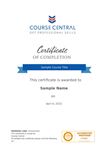
Electrical Engineering
3 Course Bundle | FREE PDF Certificates Included | CPD Accredited
Course Central
Summary
- Certificate of completion - Free
- Exam(s) / assessment(s) is included in price
- Tutor is available to students
Add to basket or enquire
Overview
Electrical engineering is one of the core branches of engineering, including the electronics, automotive, IT, gaming, telecoms, manufacturing, power, transport, utilities and construction industries. Explore electrical fundamentals, uses of power electronics rectifiers, resistors, capacitors, inductors, electronics, electric circuit analysis techniques, and AC circuits. This bundle course covers it all.
This 3 courses bundle consists of the following courses:
- Course 1: Electrical Engineering: Power Electronics Masterclass
- Course 2: Electric Circuits for Electrical Engineering and Electronics
- Course 3: AC Electric Circuit Analysis for Electrical Engineering
This bundle starts with the basic knowledge of Electrical Engineering and gradually shares expertise and knowledge. Upon course completion, you will get a complete idea of this subject with critical concepts, strategies regarding its use, and in-depth knowledge. This is entirely an online course, so you can access this course from any part of the world with a smart device and the internet.
By the end of this course, you will get complete knowledge and marketable skills. The course also comes with Accredited certificates, adding extra value to your resume and helping you stand out in the job market. Enrol on this course today and fast-track your career!
You will be able to do the following after completing this bundle course?
- Learn about the uses of power electronics rectifiers, dc-to-dc converters, and inverters
- Understand and analyze buck (step-down), boost (step-up), and buck-boost (step-down/up) dc-to-dc converter circuits
- Understand and analyze single-phase and three-phase rectifier circuits
- Electrical Engineering fundamentals
- What are electric circuits and electronics, and the fundamental quantities in circuits like voltage and current?
- What resistors, capacitors, and inductors, and how are they used in electric circuits and electronics.
- Simplification of resistive, capacitive, and inductive circuits
- Advanced electric circuit analysis techniques such as the superposition theorem, Thévenin's theorem, and Norton's theorem
- Electric circuit analysis techniques used in different electrical engineering and electronics engineering fields, such as analogue electronics, digital electronics, and power electronics
- Electronics fundamentals
- The differences between direct current (DC) and alternating current (AC)
- Sources of electricity in electric circuits and electronics
- Basic electric circuit analysis techniques using Kirchhoff's voltage and current laws, nodal analysis, and loop analysis
- Analysis of first-order electric circuits during transients
- Electric circuit analysis techniques needed for developing electronics with development boards such as the Arduino or Raspberry Pi
- EE fundamentals
- Concepts for AC electric circuit analysis, such as admittance and reactance
- Electric circuit analysis techniques used in different EE and electronics engineering fields, such as analogue electronics, digital electronics, and power electronics
- What root-mean-square (RMS) is and its importance in AC circuits
- What complex power is in AC circuits
- Complete analysis of AC electric circuits
- Power in AC circuits
- What power factor is in AC circuits
Why Choose this 3 courses bundle?
- Accredited by CPD
- Conducted by industry experts
- Get Instant E-certificate
- Fully online, interactive course with Professional voice-over
- Developed by qualified professionals
- Self-paced learning and laptop, tablet, and smartphone-friendly
- Tutor Support
And you will also get these gifts
- Free PDF Certificate
- Lifetime Course Access
CPD
Course media
Description
Course Curriculum
*** Course 1: Electrical Engineering: Power Electronics Masterclass ***
Course Introduction
- Welcome to the Course
- About Your Instructor
Introduction to Rectifiers
- Section Notes - Rectifiers
- The Ideal Rectifier
- Ideal Rectifiers
- Review of the Diode
- Diodes
Single-Phase Rectifiers
- Half-Wave Rectifiers with Resistive Loads
- Half-Wave Rectifiers with Inductive Loads
- The Freewheeling Diode
- Half-Wave Rectifiers with Capacitive Filters
- Single-Phase Half-Wave Rectifiers
- Full-Wave Rectifiers with Inductive Loads
- Full-Wave Rectifiers with Capacitive Filters
- Single-Phase Full-Wave Rectifiers
Three-Phase Rectifiers
- Half-Wave Rectifiers with Resistive Loads
- Full-Wave Rectifiers with Resistive Loads
- Three-Phase Rectifiers
Rectifier Design Example
- A Single-Phase Rectifier Design
Introduction to DC-to-DC Converters
- Section Notes - DC-to-DC Converters
- The Ideal DC-to-DC Converter
- Review of the Power BJT and the Power MOSFET
- The Basic DC Chopper
DC-to-DC Converters3
- Buck (Step-Down) Converters
- Boost (Step-Up) Converters
- Buck/Boost (Step-Down/Up) Converters
Introduction to Inverters
- Section Notes - Inverters
- The Ideal Inverter
Single-Phase Inverters
- Single-Phase Inverters with Resistive Loads
Three-Phase Inverters
- Three-Phase Inverters with Resistive Loads - Part 1
- Three-Phase Inverters with Resistive Loads - Part 2
Bonus Section
- Bonus Lecture
*** Course 2: Electric Circuits for Electrical Engineering and Electronics ***
Course Introduction
- Welcome to the Course
- About Your Instructor
Introduction to Electric Circuits and Electronics
- Definition of the Electric Circuit
- Electric Charge and Electric Current
- Alternating Current (AC) vs. Direct Current (DC)
- Definition of Voltage
- Electrical Energy and Voltage
- Definition of Power
- Introduction to Electric Circuits and Electronics
Sources in Electric Circuits and Electronics
- Independent Sources
- Example - Independent Sources
- Dependent Sources
- Example - Dependent Sources
- Electric Circuit Sources
DC Resistive Electric Circuits
- Ohm's Law
- Example - Ohm's Law (1 of 2)
- Example - Ohm's Law (2 of 2)
- Circuit Terminology
- Kirchhoff's Current Law (KCL)
- Example - Kirchhoff's Current Law (KCL)
- Kirchhoff's Voltage Law (KVL)
- Example - Kirchhoff's Voltage Law (KVL)
- Voltage Division
- Example - Voltage Division
- Current Division
- Example - Current Division
- Series Resistors
- Example - Series Resistors
Nodal Analysis of DC Resistive Electric Circuits
- Definition of Nodal Analysis
- Example - Nodal Analysis with Independent Sources
- Example - Nodal Analysis with Dependent Sources
- Nodal Analysis of DC Resistive Electric Circuits
Loop Analysis of DC Resistive Electric Circuits
- Definition of Loop Analysis
- Example - Loop Analysis with Independent Sources
- Example - Loop Analysis with Dependent Sources
- Loop Analysis of DC Resistive Electric Circuits
Advanced DC Electric Circuit Analysis Techniques
- Superposition Theorem
- Example - Superposition Theorem
- Thévenin's Theorem
- Example - Thévenin's Theorem (Part 1)
- Example - Thévenin's Theorem (Part 2)
Capacitors and Their Uses in Electric Circuits and Electronics
- Definition of Capacitors
- Charge in a Capacitor
- Current Through a Capacitor
- Voltage Across a Capacitor
- Energy Stored in a Capacitor
Inductors and Their Uses in Electric Circuits and Electronics
- Definition of Inductors
- Voltage Across an Inductor
- Current Through an Inductor
- Energy Stored in an Inductor
- Series Inductors
First-Order Transient Electric Circuits
- First-Order Transient Circuits - Introduction
- Series RC Circuits
Bonus Section
- Bonus Lecture
*** Course 3: AC Electric Circuit Analysis for Electrical Engineering ***
Course Introduction
- Welcome to the Course
- About Your Instructor
- Outline and Objectives
AC Steady-State Electric Circuit Analysis
- Sinusoids and Their Components
- Definition of Phasors
- Voltage-Current Relationship for Resistors
- Voltage-Current Relationship for Capacitors
- Voltage-Current Relationship for Inductors
Power in AC Circuits
- Instantaneous Power
- Example - Instantaneous Power
- Average Power
- Example - Average Power
- Root-Mean-Square (RMS) Value of Sinusoids
- Example - RMS Values
- Average Power in Terms of RMS Values
- Definition of Power Factor
- Example - Power Factor Calculation
- Complex Power
- Example - Complex Power
Course Wrap-Up
- Bonus Lecture
Certificates
Course Central is proud to offer a Certificate of Completion to all who complete courses successfully. Course Central tracks the learner’s course progress. However, the learner is responsible for validating the completion and understanding of the course. All Certificates of Completion can be validated from the Course Central website using the validation code.
Transcripts
A Transcript for the course with completed module details can be requested for as little as £4.99. Please note that all course Certificates and Transcripts will be titled as published on the Course Central platform.
Who is this course for?
This course on Electrical Engineering: Power Electronics Masterclass benefits professionals and individuals who can use this skill in power generation and transmission navigation systems, motors, batteries, control systems and many more. From solar-energy systems to mobile phones, Electronics innovate to meet society's communication, tech and energy needs.
A professional can use Electronics to revolutionise how we communicate (smartphones); electrical systems in medical equipment are allowing to monitor patients more effectively, and the electronics in security systems allowing feel more secure. Having skills in electronics enables one to present information is the most effective way to help the decision, makers.
Electronic and electrical engineers are highly employable and can find work in many areas, including the electronics, automotive, IT, gaming, telecoms, manufacturing, power, transport, utilities and construction industries.
Requirements
- Basic knowledge of semiconductor devices
- Basic understanding of electronic circuit analysis
- Basic knowledge of algebra
Career path
This course will lead you to many different career opportunities, here are a few prospects:
- Electrical Engineer Beginner Level - £34,978 per annum
- Electrical Engineer Expert Level - £41,9350 per annum
- Senior Electrical Engineer - £60,000 per annum
Questions and answers
Do i need any previosu understanding of electronics to complete this course?
Answer:Hello Mark, You do not need any previous understanding of electronics to do this course. This course is prepared for those who have zero knowledge of electronics. I hope this helps. Please enjoy the learning. Kind regards Course Central Support Team
This was helpful.just wanted to know if this course is right for me as I'm looking at going into serviceing as an electrical engineer for wind turbines
Answer:Hi Thomas, Electrical Engineering is a broad subject and the course helps you gain important insights on the subject. Please check the course outline to see if this would help you for your profession.
This was helpful.
Certificates
Certificate of completion
Digital certificate - Included
Reviews
Legal information
This course is advertised on reed.co.uk by the Course Provider, whose terms and conditions apply. Purchases are made directly from the Course Provider, and as such, content and materials are supplied by the Course Provider directly. Reed is acting as agent and not reseller in relation to this course. Reed's only responsibility is to facilitate your payment for the course. It is your responsibility to review and agree to the Course Provider's terms and conditions and satisfy yourself as to the suitability of the course you intend to purchase. Reed will not have any responsibility for the content of the course and/or associated materials.



